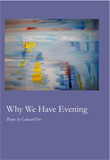December 30, 2012WHY WE HAVE EVENING
Review by Christopher J. Jarmick 
Cherry Grove Collections
P.O. Box 541106
Cincinnati, OH 45254-1106
ISBN 9781934999905
2010, 114 pp., $18.00
www.cherry-grove.com
Leonard Orr’s almost sexual obsession with language refuses to stay hidden behind closed doors, and is celebrated in a graceful literate formalistic style throughout his latest collection of 76 poems entitled Why We Have Evening. He does for romantic poetry what the wonder bra has done for cleavage.
In my dream I was the ocean
surging and lapping an irresistible beach.
you came and swam in me every day,
[….]
You gave yourself to my salty waters.
—“Permeable”
The poems here are satiated with sensual language and address longing, passion, love, broken hearts, bittersweet memories and romantic fantasy. They are fearlessly passionate, get almost corny and unapologetically flaunt puns and clichés but with specific purpose—not because the writing or writer is lazy. The poems are full of double entendres but not just sexual—these pieces address ‘the body’ as in male, female, heavenly and an artist’s ‘body’ of work.
I thought about you as I sat up in bed and stretched
going from hyphen to circumflex to accent grave.
—“I Thought About You All Day While I Worked”
The poems at times reflect Orr’s academic background in their formal style and exquisite use of language but you won’t find the poems stuffy or overly rigid. He likes to write spontaneous poems. Dr. Leonard Orr was Washington State University ‘s Academic director of College of Liberal Arts programs and an English professor and is currently WSU Vancouver’s assistant vice chancellor of academic affairs. He is the author or editor of thirteen books literary criticism or critical theory (including: Joyce, Imperialism, and Postcolonialism published by Syracuse University Press in 2008 and Henry James’s The Turn of the Screw published by Continuum in 2009. He is also a prolific abstract painter.
But now that you carry me inside
Your bones, your cute pink colon,
your little big toe, under your tongue,
inside your breasts, every place I
have adored and pressed, you have
new strength and joy.
— “Why We have Evening”
The exposed, almost martyred lover’s voice is clear here:
My naïve calendar has so much sadness now
I could not stand it. Little did I know,
little did I know. I snipped away the foul days.
… I carefully
snipped away performing daychotomies,
weekectomies and sutured the ragged sad edges
Together, wetting the wounds as needed
with my abundant fluids, all my excess.
—”Past Tense, Future Tense”
Busloads of Brazilians and wispy arthritics
turn into golems with the black mud. Alone
I build up surface tension dowsing for you,
the only living organism in this sea.
—”Dead Sea”
There’s an occasional ridiculously melodramatic use of language on display (“Winter is nothing to me. I already have an Antarctica in my heart.” Or “I am an inverted jellyfish”) used for effect among the usually careful manipulated phrases that are allowed at to flow over and out of the cup at times (“Let me be your strawberries in season; find me Friday in the farmer’s market….peel and boil me, steam me, sprinkle me with flaxseed gluten, taste my vital gluten.” )
The metaphors are shamelessly reminiscent of Blake, Shakespeare, Wordsworth, Keats, Shelley, and Byron and we really can’t help but bring some degree of modern cynicism as we read some of these poems—but I found myself laughing at myself and Orr’s wit. He’s clever in the sort of well-read academic way that’s rarely attempted anymore.
When he compares falling in love to a car skidding out of control on an icy road you can’t help but think it’s ridiculous and bordering on the sort of thing you might read in a bodice ripping romance novel—but there’s more going on here. When people are in passionate love, they usually write terrible love poems. Here, Orr takes the excess and subverts it, cleverly, with wit, humor and purpose. He avoids condescension, bitterness and if you detect cynicism it is because you’ve brought your own. The sentimentality and pathos we see here is earned—not just done for a cheap manipulation.
The sense of humor born of a broken heart is here, but it’s the sort of poetic heart that is still foolish enough to continue to trust and believe in love.
I want a woman who will squeeze my soul directly into her
veins so she becomes addicted to me, as I am to her.
I want a language- drunk woman who will make me kick my
serifs off, mess up my gray Times Roman, persuade my bones
to incline into Garamond italics, let me loll playfully in her pink
Helvetica and suddenly bloom into bold.
—”Personal Ad”
Orr’s Why We Have Evening is a poetry collection I will be reading several times. It’s part put-on, part sincere but I’m unable to resist liking it.